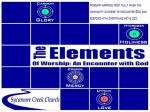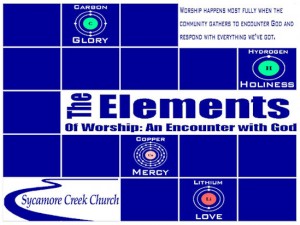 During the first worship service in the series The Elements of Worship, we asked people to write a definition of worship. Those definitions can be found here. During the last worship service in the series, we asked people to write a definition again and underline anything that had changed for them. Here are those new definitions:
During the first worship service in the series The Elements of Worship, we asked people to write a definition of worship. Those definitions can be found here. During the last worship service in the series, we asked people to write a definition again and underline anything that had changed for them. Here are those new definitions:
Worship is…
Responses from Sunday, Dec. 19, 2010
-Love
-Gathering with others, releasing my burdens, being reminded that I matter to God; knowing that I’m not alone
-Listening, understanding, doing, thinking, praising, praying, following God – both personally and in community
-Telling God that He’s better than me. But hey, that’s cool, we can still rock it together
-God bringing me to the full understanding of what it means for me to “bend the knee” (worship in Hebrew). Leading, guiding,, healing & directing me to the freedom for me in true worship so I can do the same in my community.
-Giving God all the glory and praise in everything you do…your everyday things
-Community with God in words, & thoughts, prayers & songs
-Experiencing God’s love & having it impact you so you can share it with others
-To kneel, praise & talk with the Lor
-A response to God, giving back with all the gifts He gave in response to his love
-Seeing, hearing, feeling, & giving all that God has in his being. And to share in a way each of us can.
-Living in awe of God’s glory, in respect of his holiness, and with gratefulness for his mercy – all leading to a life of love for God & others.
-A full-bodied response to God’s glory, holiness, mercy and love.
-Glory, holiness, mercy, and love for God.
-Living out your faith, practicing what you preach the rest of the week
-A response to God’s gifts to us; praise, thanksgiving, adoration, joy. Standing in His presence
-The whole body (singing, praying, believing, listening, looking)
-Coming together as a community, serving and worshipping God with all of our hearts and everything we have
-finding a way in this life that is meaningful and enjoyable and brings others to faith & growth in love with God
-Any time and/or place that focus can be turned to God and glory can be given
-Receiving that which you are unworthy of à moving forward in confidence even when failure looms à knowing God has not deserted you & you are part of His plan
-Giving everything to God through praise and thankfulness, done in thousands of different ways
-All encompassing my love, joy, belief, and hope in the beauty of our Father God
-Love; holy; joyous; a choice; shouting, dancing, peace
-The humility sent by God
-Growing, loving, evolving, learning…not definable
-Connecting to God through praise & thankfulness, while acknowledging His holy presence
-Having your cake and eating it too! YUM! (But it’s not about the cake!)
-Not as boring…
-Listening to God
-Learning about God, Jesus & Christianity
-Loving God back
-Spending time in God’s presence by one’s self or in community. Taking the time to ask God forgiveness, strength and direction.
-To give honest and true praise
-Focusing on God – who He is, what He’s done – & responding with inwardly & outwardly to Him
-Alexis singing the “element” song
-Meeting God everywhere at all times & circumstances with openness to do & learn from Him
-Communion with God, to be in His presence & listen, accept His love
-Acknowledging God and his total greatness, honestly open with Him, walking with Him and serving Him by serving others. Doing this alone and in community
-The study and understanding of who God is
-Thanking God, joining with others to share the love, joy, happiness & hope. Surrendering & trusting in God – for everything
-Total and true devotion (undistracted)
-Our natural response to the mercy, glory, holiness, and love that God shows us, and our desire to share it
-The realization of God’s love and mercy and the want and need to spread it, what God designed us to do
-Thanking him and seeking a deeper walk with him
-Different for every individual, but it always involves God
-Worship
-Music
-Listening to God, praising God, talking to God
-Celebrating God’s holiness, glory, mercy, and love and responding with obedience
-Giving praise to God for he is in a way that allows the worshipper to perform for God in a meaningful way
-Getting together with others to learn about God & his love and to share it with others
-Devoting your time to praise God’s love and holiness. Giving yourself time to reflect on the ways in which God has revealed himself in your life, and give thanks
-Everyone acknowledging God’s glory & holiness, and mercy & how we respond to it. Yet, everyone worships in their own way
-More fun when someone is sitting close beside me
-Our response to God’s love for us
-How we respond to God
-Spending time with God and understanding & appreciating God’s character more fully
-Time with God that is intentional and dedicated, It is personal & meaningful, and can also be shared with or among others.
-Praise
-Spending time with God; God’s glory, holiness, mercy & love; not just on Sundays; singing, praying, reading, listening, giving
-Our response to God (individual & communal) for who He is and what He has done
-Praising God through community and actions
-?
-Singing loudly & out of tune!
-Giving thanks
-Opening your heart to encounter God, and sharing the love you receive with your community & others
-Meaningful and cleansing


Recent Comments